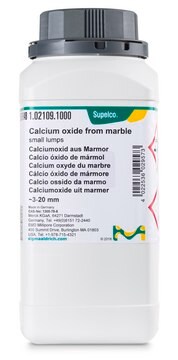634182
Calcium oxide
nanopowder, <160 nm particle size (BET), 98%
Synonym(s):
Lime, Quicklime
Sign Into View Organizational & Contract Pricing
All Photos(3)
About This Item
Linear Formula:
CaO
CAS Number:
Molecular Weight:
56.08
EC Number:
MDL number:
UNSPSC Code:
12352302
PubChem Substance ID:
NACRES:
NA.23
Recommended Products
Assay
98%
form
nanopowder
particle size
<160 nm (BET)
bp
2850 °C (lit.)
density
3.3 g/mL at 25 °C (lit.)
SMILES string
O=[Ca]
InChI
1S/Ca.O
InChI key
ODINCKMPIJJUCX-UHFFFAOYSA-N
Looking for similar products? Visit Product Comparison Guide
Related Categories
General description
Calcium oxide (CaO), also known asquicklime, is an ionic compound widely recognized for its high reactivity andversatility. This product features a particle size of <160 nm, a density of3.3 g/mL at 25 °C, and an assay of 98% trace metals basis. Calcium oxideappears as a white solid and is highly hygroscopic, readily reacting withmoisture in the air. Calcium oxide is extensively utilized in variousindustrial applications, including the production of cement and glass, where itacts as a flux. It is also employed in the steel industry as a slag conditionerand in the manufacturing of calcium hydroxide through hydration. Additionally,CaO is used in water treatment processes to adjust pH levels and in theproduction of calcium-based chemicals. CaO is also used in:Synthesis of Nanoparticles:Calcium oxide serves as a precursor in the synthesis of calcium-basednanomaterials, which have applications in catalysis and drug delivery. Glass Manufacturing: Fluxing Agent: CaO is used as a flux inglassmaking to lower the melting point of silica, improving the melting processand enhancing the properties of the glass.
Application
- Use of Calcium Oxide in Sustainable Concrete Production: Investigates the role of calcium oxide in enhancing the anti-carbonation properties of alkali-activated slag concrete, suggesting its utility in sustainable building practices (P Shi et al., 2024).
- Calcium Oxide from Agroindustry Waste for Dental Applications: Evaluates the synthesis of calcium oxide nanoparticles from eggshell waste, focusing on their potential in promoting dental tissue regeneration (J do Amparo Madureira et al., 2024).
- Calcium Oxide in High-Ash Coal Slime Remediation: Discusses the use of calcium oxide in soil amendments derived from high-ash coal slime, enhancing adsorption performance for environmental cleanup (Y Tian et al., 2024).
- Development of Calcium Oxide-Based Activators: Details the use of waste calcium oxide fly ash as an activator in the vulcanization of natural rubber, reducing the need for zinc oxide and enhancing environmental sustainability (W Naebpetch et al., 2024).
Legal Information
Product of Engi-Mat Co.
Signal Word
Danger
Hazard Statements
Precautionary Statements
Hazard Classifications
Eye Dam. 1 - Skin Irrit. 2 - STOT SE 3
Target Organs
Respiratory system
Storage Class Code
13 - Non Combustible Solids
WGK
WGK 1
Flash Point(F)
does not flash
Flash Point(C)
does not flash
Personal Protective Equipment
dust mask type N95 (US), Eyeshields, Gloves
Choose from one of the most recent versions:
Already Own This Product?
Find documentation for the products that you have recently purchased in the Document Library.
Customers Also Viewed
Marco Faustini et al.
Nanoscale, 5(3), 984-990 (2012-12-19)
We report the simple preparation of ultra-thin self-assembled nanoperforated titanium calcium oxide films and their use as reactive nanomasks for selective dry etching of silicon. This novel reactive nanomask is composed of TiO(2) in which up to 50% of Ti
E Belon et al.
The Science of the total environment, 439, 87-95 (2012-10-16)
The inputs of ten trace elements (As, Cd, Cu, Cr, Hg, Mo, Ni, Pb, Se, Zn) to French agricultural soils have been assessed. The six main sources considered were: pesticides, mineral fertilizers, animal manure, liming materials, sludge and composts and
Mohammad Mahdi Najafpour et al.
Dalton transactions (Cambridge, England : 2003), 42(14), 5085-5091 (2013-02-12)
Inspired by Nature's catalyst, a nano-size layered manganese-calcium oxide showed a low overvoltage for water oxidation in acidic solutions, which is comparable to platinum.
Mahsa Naghshineh et al.
Food chemistry, 136(2), 472-478 (2012-11-06)
The application of high hydrostatic pressure technology for enzymatic extraction of pectin was evaluated. Cellulase and xylanase under five different combinations (cellulase/xylanase: 50/0, 50/25, 50/50, 25/50, and 0/50 U/g lime peel) at ambient pressure, 100 and 200 MPa were used
Vasilije Manovic et al.
Environmental science & technology, 46(22), 12720-12725 (2012-10-24)
This paper presents a novel method for reactivation of spent CaO-based sorbents from calcium looping (CaL) cycles for CO(2) capture. A spent Cadomin limestone-derived sorbent sample from a pilot-scale fluidized bed (FBC) CaL reactor is used for reactivation. The calcined
Our team of scientists has experience in all areas of research including Life Science, Material Science, Chemical Synthesis, Chromatography, Analytical and many others.
Contact Technical Service









